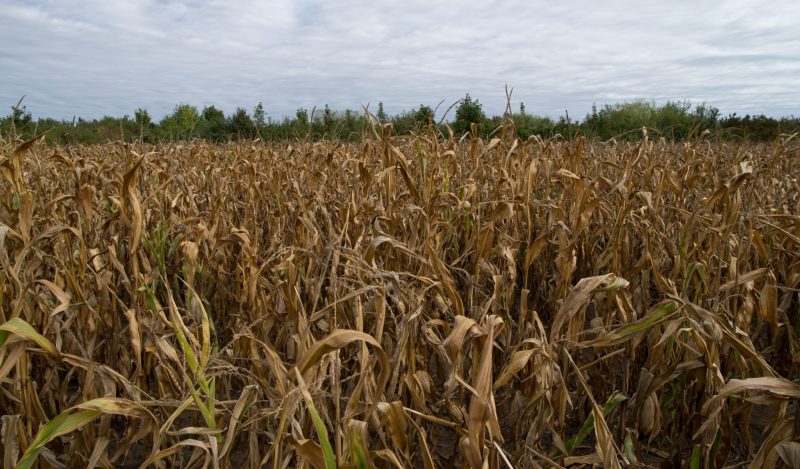In every war, there is necessarily an enemy force, and the war on our food supply is no exception.
My previous article addressed the ongoing attacks on farmers across the globe. In today’s article, we will look at some of the culprits behind this agenda. For anyone who delved into the entities behind the tyrannical Covid policies, many names on the list below will seem quite familiar.
Bayer/Monsanto
Bayer merged with Monsanto in 2018, combining the companies responsible for Agent Orange and pioneering chemical warfare. In 1999, Monsanto’s CEO Robert Shapiro bragged that the company planned to control “three of the largest industries in the world—agriculture, food, and health—that now operate as separate businesses. But there are a set of changes that will lead to their integration.” Today these chemical manufacturers control a huge percentage of the world’s food supply.
Cargill and the US Department of Agriculture (USDA)
Cargill is a World Economic Forum partner and the largest private company in the United States. This behemoth monopolizes unimaginably vast swaths of the global food industry, including meat processing in the United States. Cargill’s business practices, along with bigger-is-better policies enforced by their cronies at the United States Department of Agriculture, have led to the closures of many local abattoirs which forced farmers to depend on a few corporate mega-slaughterhouses. This leaves farmers waiting 14 months or longer for butchering slots, for which they often must transport their animals hundreds of miles—indeed, farmers and ranchers must book processing dates up to a year before the animal is even born. The high fees charged by Cargill’s slaughterhouses contribute to the skyrocketing price of meat—all while the farmers themselves are barely paid enough to cover the cost of raising the livestock. The USDA, meanwhile, makes sure their policies prevent farmers from processing meat themselves on their own farms.
Wellcome Trust
The Wellcome Trust, the former owner of Glaxo before it merged with SmithKline, played a major role in Britain’s Covid debacle and is unapologetic about its goal of reducing your food sovereignty. Wellcome Trust funds Livestock, Environment and People (LEAP), an organization dedicated to developing and testing behavioral modifications to coerce the public into removing meat and dairy from their diets. LEAP’s co-director Susan Jeffs bemoans that motivating people with environmental impact labels on their foods does not seem to work: “People are already settled into very established habits” and suggests instead altering what the industry provides, thereby forcing consumer choice. Wellcome Trust researchers recommend “availability interventions” that “rely less on individual agency” to reduce access to animal food products. Researcher Rachel Pechey opines that “meat taxes show a promising evidence for effectiveness but have been less acceptable in survey work…we don’t want to just go for the most acceptable [solutions].”
The World Health Organization
Dr. Tedros Adhanom Ghebreyesus, the WHO’s Director-General, would like you to believe that food production is responsible for almost one-third of the global burden of disease. He calls for transforming the global food system toward plant-based foods, reducing meat and dairy in our intake, and enforcing policies to save the climate through restricting diet. A WHO 2022 report concluded that “considerable evidence supports shifting populations towards healthful plant-based diets that reduce or eliminate intake of animal products.”
World Economic Forum
You are likely familiar with the World Economic Forum and their Great Reset agenda. Visit their webpage and treat yourself to such morsels as 5 reasons why eating insects could reduce climate change, why we need to give insects the role they deserve in our food systems, and why we might be eating insects soon. Suffice it to say that their plans for your dietary future are clear.
EAT Forum, the Lancet, and their Big Tech and Big Chemical Partners
The EAT Forum is “dedicated to transforming our global food system through sound science, impatient disruption and novel partnerships.” It was co-founded by the aforementioned Wellcome Trust, the Strawberry Foundation, and the Stockholm Resilience Centre. Their FRESH initiative—Food Reform for Sustainability and Health—aims to transform the global food system. Partners in the FRESH initiative include Google, Cargill, Syngenta, Unilever, Pepsico, and many chemical processors such as BASF, Bayer, and DuPont—a rather odd cast of characters for developing a healthy and sustainable dietary plan. EAT’s Shifting Urban Diets Initiative advocates for cities to adopt the Lancet-endorsed Planetary Health Diet, in which plant-based proteins are set to replace meat and dairy. Red meat is limited to 30 calories per day. A report drafted by EAT found that the transformation they want to foist upon our diets is “unlikely to be successful if left up to the individual,” and “require(s) reframing at the systemic level with hard policy interventions that include laws, fiscal measures, subsidies and penalties, trade reconfiguration and other economic and structural measures.”
The Rockefeller Foundation
Members of the Rockefeller family may carry more blame than anyone else in history for turning agriculture away from independent family farms towards corporate conglomerates.
In 1947, Nelson Rockefeller founded the International Basic Economy Corporation to modernize and corporatize agriculture in South America, particularly in Brazil and Venezuela. IBEC transformed farming to depend on expensive machinery and inputs that priced subsistence peasant farmers out of viability. The American International Association for Economic and Social Development (AIA), a Rockefeller-funded philanthropic organization, helped build the market through which IBEC could enrich its owners. While IBEC’s promotional literature claimed that the company was generously assisting the Third World by providing necessary consumer products while turning a profit, on closer examination, it was simply a business enterprise built on the Rockefellers’ old Standard Oil model, in which smaller competitors are forced out using monopolistic practices before prices are raised.
This tactic was taken to a whole new level with the so-called Green Revolution, first in Mexico in the 1940s, then in the Philippines and India in the 1960s, as well as in the United States. Traditional farming practices such as the use of manure as fertilizer for heirloom native crops were replaced with a model of mechanized chemical farming, using Rockefeller-funded new seed varieties which had been developed to require petrochemical fertilizers and pesticides to produce significantly increased crop yields compared to the traditional crops grown by peasant farmers in these countries.
It is worth noting that the Rockefellers, as oil oligarchs, stood to profit handsomely from the petroleum-based fertilizers and pesticides that this new method demanded. The crops grown were almost all cereal crops like rice and replaced more nutrient-dense, traditional crops like millet. India experienced an increase in food but a decrease in nutrition: with more empty calories but fewer fruits, vegetables, and animal proteins, micronutrients disappeared from the diet. Anemia, blindness, fertility problems, low birth weight, and immune impairment increased.
While the Green Revolution was hailed as the solution to world hunger and poverty, it also poisoned local water supplies, depleted the soil, and left farmers drowning in debt as they could no longer independently produce the fertilizer and seeds they needed. Informed readers can see how the later Monsanto GMO Roundup-Ready seed model followed this playbook established by the Rockefellers.
In 2006, the Rockefeller Foundation, Bill Gates, and others pushed the Alliance for a Green Revolution in Africa, or AGRA, and they again followed this proven playbook. Since AGRA’s launch, African biodiversity has been lost, and the number of severely undernourished people in sub-Saharan Africa has increased by nearly 50 percent, even by the UN’s own reports. Just as in India, farmers are being tricked into abandoning nutrient-dense, drought-resistant crops like heirloom millet in exchange for the empty calories of GMO corn. Hundreds of African organizations have demanded that this neocolonial project end, leaving the future of African agriculture in the hands of the native farmers who know the land best.
Now the Rockefeller Foundation has set its sights on the US food system with its Reset the Table agenda, handily launched in 2020 just weeks after the Great Reset was announced. Under rosy language calling for inclusivity and equity, the report states that “success will require numerous changes to policies, practices, and norms.” This includes a major focus on data collection and objectives that align closely with the One Health Agenda—more on that in a future article.
Bill Gates and the Gates Foundation
Bill Gates has followed the Rockefeller playbook for fumigating his fortune and transforming his image—while building more wealth—through the cynical ploy of philanthrocapitalism.
His fingers are deep in every public health pie, and his influence is nearly equal in the food wars. Besides financing the development of fake meats, he is behind the aforementioned AGRA program, is investing in geoengineering programs to dim the sun, and as of January 2021, owned 242,000 acres of prime US farmland, making him the largest private owner of farmland in the US. It is disconcerting to think that a man who believes we should phase out real meat controls so much of the method of production.
USAID and BIFAD
Another organization pushing you to eat bugs is USAID. This may surprise some of you who think of USAID as an organization dedicated to helping third-world countries, rather than as a longtime Trojan horse for CIA operations. (Skeptical of that claim? Go down the rabbit hole here and here and here and here.) Their Board for International Food and Agricultural Development, known as BIFAD, released a report titled “Systemic Solutions for Climate Change Adaptation and Mitigation.” This report calls for a complete transformation of the food supply and global agriculture. They propose to do this through ESG scores, carbon tracking, and eating insects.
So how do these organizations manage to push their agenda on the global population? We will cover that in a future article.
Published under a Creative Commons Attribution 4.0 International License
For reprints, please set the canonical link back to the original Brownstone Institute Article and Author.



